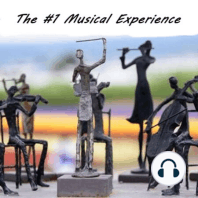33 min listen

"NOSTALGIA" - Miami Beach High School Class of 55 Album#2
"NOSTALGIA" - Miami Beach High School Class of 55 Album#2
ratings:
Length:
58 minutes
Released:
Oct 10, 2021
Format:
Podcast episode
Description
THE ORIGIN OF THIS MUSIC:Created by Gibbs Williams It is hard to believe it has been decades since I graduated from Miami Beach Senior High School. It is even harder to believe that I received an invitation to attend the 65th reunion. Unfortunately, with the covid pandemic still in the air, although vaccinated, I thought it prudent better to pass up this event hoping conditions fare more salutary for the 70th. Although disappointed I would miss the reunion I was struck by a wave of pleasurable nostalgia. Recalling those the best of those glorious days I remember the feelings of the cool Miami Beach breezes enveloping us on our weekly Friday night dances in the patio of our high school. All who attended seemed hypnotized with feelings of a pervasive feeling of at-one-ment in which we collectively bathed in what was then and even now experienced as our own unique mixture of heroin- like- atmosphere. This natural high was experienced by many of us as nothing short of pure unadulterated nostalgia. Nostalgia then and now was like our living in a collective commune protecting us from what probably would have been experienced as overwhelming normal adolescent pain if we had been open to feeling it. I was especially nostalgic remembering my self and four other guys daring to form a small combo good enough to play at all of the school dances. We even played well enough that every New Years Eve a Miami Beach Hotel hired us to perform. Our Small combo consisted of Drums (Marvin Guccion), Bass (John Schaffer), Trombone (Peter Weill), Trumpet (Kenny Kupper) and Piano (Gibbs Williams). Unknowingly we had no knowledge that we were on the cutting edge of what would soon be an explosion of worldwide bands. In is in this memorable context that I wish to share an album of some of those unforgettable songs which best seem to celebrate the richness not only of those glorious days from the 9th to the 12th grade, but all the years that have too quickly passed - as well as the years that are yet to come. It is unfortunate that we never recorded our iconic sounds. The best I can offer with the goal in mind of capturing the sounds we made are my original arrangements made on my Yamaha synthesizer. The songs we played were standards from the forties and fifties. I have titled this compilation Nostalgia. "NOSTALGIA" - 65 th REUNION - MIAMI BEACH HIGH SCHOOL - CLASS of 55Album1 Moon Over Miami , Ebb Tide, Star Dust, It Might As Well Be Spring, Teguilla, The Hucklebuck, Five Foot Two, Somewhere Along the Way, Im In The Mood For Love, Again, Blue Moon, Miami Beach Rhumba, Because of You, Rock Around the Clock, Down By The Riverside, Tammy's In Love, Where Is Your Heart, Don't Blame Me, If I Loved You, I'll Take Manhattan, The Man I Love, A Secret Love, Autumn Leaves, Summer Time, Mona LIsa, Take the A Train, Album 2Perfidia, It's No Sin, It Had To Be You, For Me And My Gal, Thrill Me, You're Just In Love, Yellow Bird, Canadian Sunset, A Taste Of Honey, Too Young, Saint Louis Blues, My Foolish Heart, You Belong To Me, Sleepy Time Gal, Body and Soul, The Nearness Of You, Misty, Sweet Georgia Brown, Blue Skies, Tenderly, Some Enchanted Evening, Bali High, Bewitched, Once Upon A Time, As Time Time Goes By, Aways, Fight Song Of The Miami Beach Hight Marching Band A and B. I know all was not perfect then as we were all struggling to survive adolescence so those days were hardly always serene. Yet, there was, and still is for me and I imagine for many of my class mates, a certain undeniable 'specialness' about our class which for many of us still acts like a permanent magnet pulling us back again and again to re-unite. As for me, if we had been recognized as ground-breaking I am certain our lives at least vocationally would have taken a much different route. However, I can honestly say that I am happy to being a still practicing psychoanalyst in New York City
Released:
Oct 10, 2021
Format:
Podcast episode
Titles in the series (100)
Edvard Grieg - Peer Gynt Suites 1 & 2 (1888-91): Why We Should Expose Our Kids To Classical Music https://ourtownlive.net #herbw79Grieg (1843-1907) was one of the definitive leaders of Scandinavian music and his influence was great. Although composing many short piano pieces and chamber works,... by The #1 Musical Experience